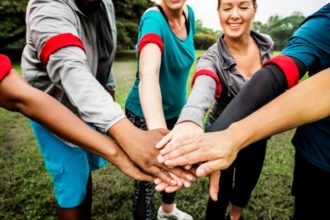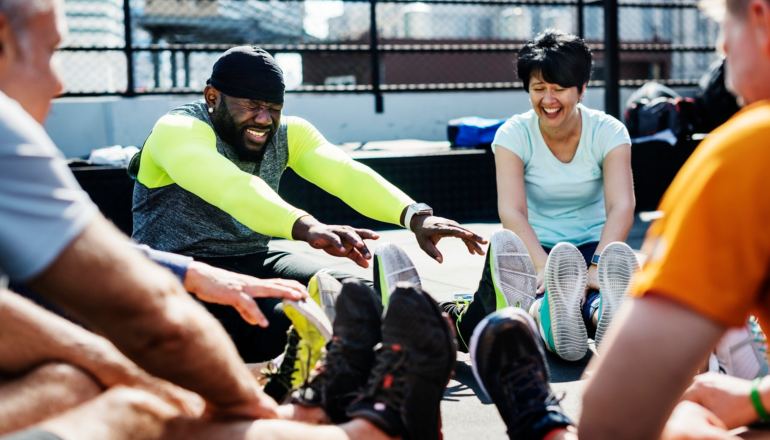 Reading Time: 7 minutes
Reading Time: 7 minutesIf you exercise in a group, you’ve probably noticed how effective (and enjoyable) it can be to work out with others. In fact, exercising in a group has been shown to boost physical performance, enhance pain tolerance, reduce feelings of discomfort and fatigue, and promote social bonds.
Beyond the physical act of exercise, we also know that being part of a team delivers a host of other benefits. Teams can help us:
- Solve problems
- Have fun
- Create new things
- Share ideas
- Feel more engaged, connected and inspired
- Define our identity and sense of self
- Satisfy our innate need to belong
- Increase resilience and provide support
- Develop empathy and generosity
- Improve social cohesion and cooperation
- Share meaning and purpose
- Better navigate life’s physical and mental stressors
- Improve health and well-being
- Reduce feelings of depression and anxiety
I’m sure you’ll agree, that’s an amazing list of benefits. But, have you ever wondered why being part of a team makes us more successful?
It turns out that behavioral scientists have pinpointed the characteristics of successful groups and uncovered why the good groups work. The great news is, we can use these findings to build teams, groups, and support networks that enhance our chances of success in all areas of life—including our health and fitness, career, relationships, social connectedness, and personal development.
But, before we jump in to all that, let’s explore why humans originally developed a group psyche.
Why Science Says Human Beings Like to Form Teams
From an evolutionary perspective, humans instinctively sought out other people and formed tribes. This behavior was driven by our desire to survive. After all, we had a better chance of surviving the harshness of early times in the safety of groups. Forming tribes meant we could share food, warmth, and shelter, and better manage the danger of attacks from animals (or other tribes).
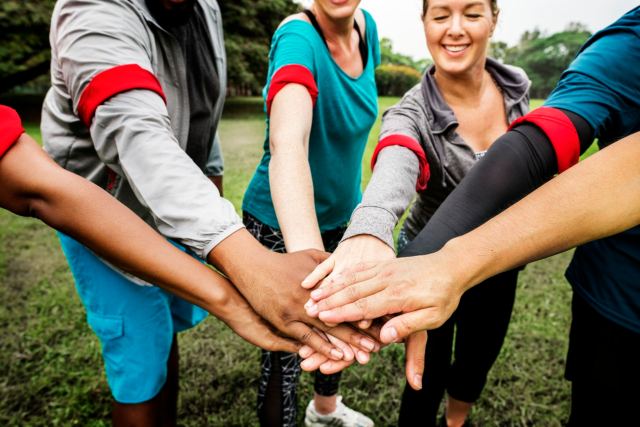
Once these initial survival concerns were satisfied, humans developed a psychological need to belong. The tribe dynamic gave us a sense of inclusion, acceptance, and identity. We began to see ourselves as part of something larger. We shared a sense of purpose and commonality. We began to crave the social contact and bonding that group environments provided.
Fast forward to modern times, and we now spend a significant part of our lives in groups. In fact, many of our everyday activities occur in groups, whether we’re working, relaxing, learning, socializing, exercising, or having fun. From family units, roommates, friend circles, gym buddies and work teams to organizations, communities, societies, and cultures — we’re heavily influenced by group dynamics, whether we realize it or not.
However, the mere fact we gather in groups doesn’t necessarily make them effective teams. At some stage, most of us have been in a group that hindered, rather than enhanced, our lives. So, what factors make a great team, and how do we utilize them for good?
First, to better understand team dynamics, let’s take a quick primer on group psychology and the key elements that create effective teams.
1. Behavioral Synchrony
Have you ever had that feeling of being completely connected to another person? Where you felt on the same wavelength, totally understood, and just clicked? That’s behavioral synchrony. It happens when we’re in a flow state with others — we feel in-sync, we’re coordinating our minds, and we are moving in the same direction.
While this state of mind can’t be forced, it can be developed by physically moving together. For example, by exercising, dancing, singing, clapping in time with music, walking in step, or mirroring each other’s posture. These physical activities help coordinate group behavior, enhance cooperation, and strengthen bonds between group members, which in turn fosters empathy, perspective, and trust.

2. Hive Psychology
There’s no denying humans can be individualistic and self-interested. We have naturally evolved to seek solutions that benefit ourselves, which often translates into a competitive streak. These traits aren’t inherently good or bad — they’re simply part of a psyche that has helped humans survive and thrive.
But there’s another side to human behavior called hive psychology, where we switch our minds from pursuing individual needs to facilitating group needs. In this state, we think less about “me” and more about “us.”
Hive psychology draws its name from the behavior of bees in hives, where groups of bees act cooperatively, cohesively, and selflessly as a single unit to achieve the best result for the hive as a whole. In humans, groups that utilize hive psychology show greater connection, understanding, and relatedness. They also have higher levels of well-being, happiness, and hope. By temporarily suppressing our individualism, we immerse ourselves in the group’s shared purpose and flourish in ways not possible on our own.
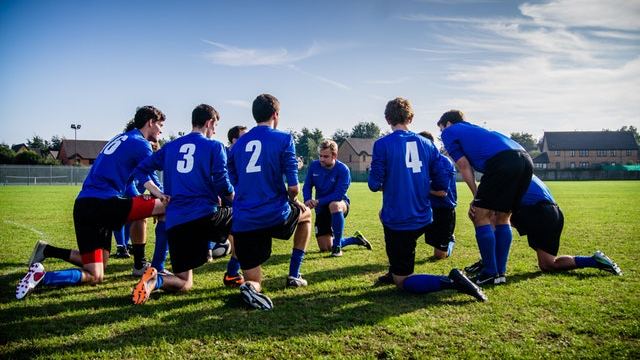
3. Social Facilitation and Cognition
Have you noticed you tend to behave or perform better when other people are around (or, when you know someone is watching)? This concept is known as social facilitation. It describes the extent to which our behavior is enhanced by the mere presence of other people — whether that presence is real or implied.
This explains why we tend to perform better when exercising with other people, why we tend to eat better when we’re held accountable by others, and why solo entrepreneurs seek out co-working spaces to enhance their productivity and creativity.
This phenomenon ties into another concept called social cognition, which describes how the knowledge of two individuals, when combined, produces more knowledge than the two minds alone. In other words, the whole is greater than the sum of its parts.
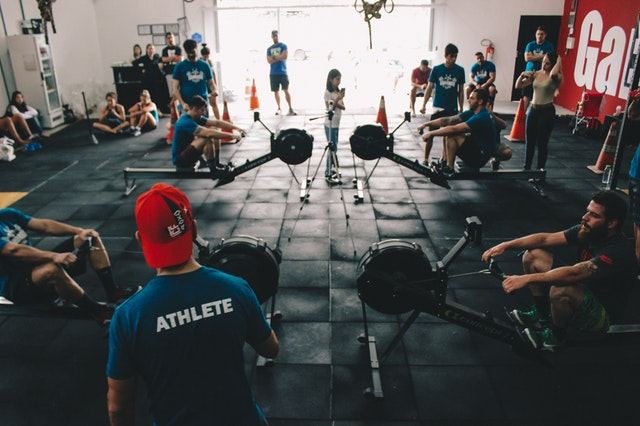
The Key Elements of a Productive Team
Now that we understand the psychology behind why teams make us more successful, let’s look more at the how. Here are the key elements that make up a highly-functioning and well-developed group:
- Participating in common activities
- Having shared goals
- Encouraging collective discussions and conversations
- A strong sense of social support
- Having mutual empathy and trust
- Sharing knowledge with others
- Using accountability and responsibility
- Having a unified purpose
- Promoting cohesive bonds
From this list, think about your current groups, teams, communities, and support networks. Which elements exist in your groups and teams? Are there areas that are missing or that could be improved? How could those areas be improved?
(Tip: these questions are great topics to discuss within your group.)
How the Whole Life Challenge Helps
If you’re familiar with the Whole Life Challenge, you may have noticed many of these elements exist within the WLC community.
When you participate in a Challenge you are part of a worldwide group of people, pursuing shared goals, engaging in collective discussions, sharing experiences and knowledge, providing social support, participating in online and offline activities together, and providing accountability and structure. You can also join teams of like-minded people within the Challenge community to provide specific levels of support, experience, and accountability.
All of this culminates into the shared purpose of making your life — and the lives of others — feel healthier, happier, and more connected.
How You Can Find Your Teams
If the phenomenon of team success is sounding good to you, and you’d like to expand your support network, here are a few suggestions:
- Volunteer for charitable organizations, hospitals, museums, tourism centers, or community associations.
- Attend local events such as fetes, festivals, school activities, or neighborhood events.
- Join running groups, gym groups, sports teams, or swimming squads.
- Connect with social clubs, book clubs, gardening clubs, or cooking clubs.
- Take a class or start a new hobby.
- Join an online community (via social networking sites, chat rooms, forums, discussion boards, or blogs).
- Get involved with a professional society or networking group.
- Join us in an upcoming Whole Life Challenge.
- Sign up for Lifeline coaching with WLC Co-founder Andy Petranek.
Creating a fulfilling, healthy, and happy lifestyle can be challenging experience, but having a team to support, motivate, and inspire you can make all the difference. By building your support network with the above in mind, not only will your chances of success be higher — it’s likely you’ll enjoy the journey as well.

